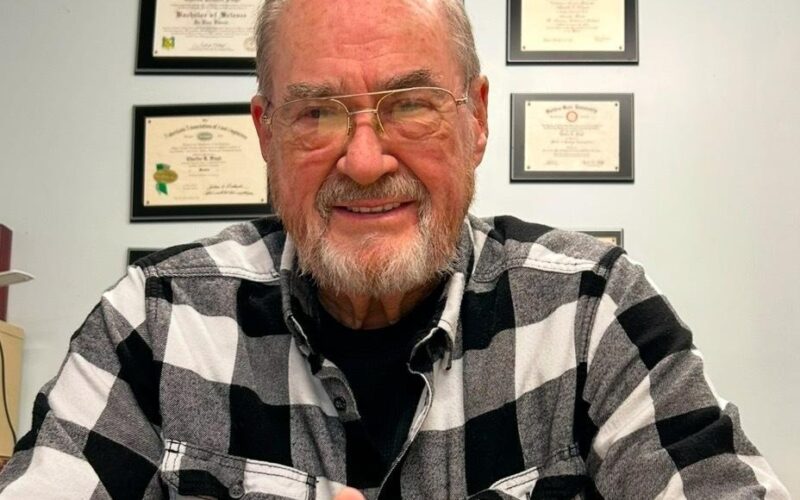Content oversight provided by Studio 1847
In an era where modern challenges often leave faith communities searching for answers, a new voice is emerging not from a pulpit but from a lifetime of construction sites, courtrooms and naval service. Charles R. Floyd, a seasoned project manager, veteran and juris doctor, has traded architectural blueprints for biblical ones in his compelling new work, ”From Acts to Action: Guidance for Today’s Churches and Christians.” This is not a theoretical theological treatise but a practical field guide, built on the bedrock of experience and a deep conviction that the solutions to today’s church struggles are found in the first century’s original playbook: the Book of Acts.
Deconstructing Acts: A two-part blueprint for growth
“From Acts to Action” is structured around a powerful yet simple central thesis: The growth and vitality of the early church were catalyzed by two types of forces, internal and external. Floyd meticulously guides the reader through 14 key passages from Acts, dissecting moments of divine intervention, persecution and personal transformation to illustrate his point.
The “Internal Forces” section examines the organic growth within the believing community. Floyd opens with the iconic scene in Acts 2, where the early believers’ devotion to teaching, fellowship and prayer created an irresistible community of love and mutual support, resulting in daily growth. He highlights the transformative inclusion of Paul, a former persecutor, arguing that God often brings unexpected people into the fold to strengthen and expand His work in ways the existing community might resist.
The “External Forces” section shifts to the pressures from outside the church that, paradoxically, fueled its spread. Floyd analyzes instances of direct persecution, showing how opposition scattered believers and thus disseminated the Gospel far beyond Jerusalem. He delves into the dramatic story of King Herod Agrippa’s demise, illustrating how God sovereignly deals with opposing powers. These narratives offer a profound sense of perspective to contemporary churches facing cultural headwinds, suggesting that such challenges have always been part of the Christian story and can be met with resilience.
From ancient text to modern practice: The application
At the end of each biblical exposition, he includes two dedicated sections: “Application to the Church” and “Application to the Individual.” This is where his background as a project manager shines, turning ancient history into actionable insights.
For church leaders, he discusses practical matters like staff vetting, financial stewardship and the danger of letting programs overshadow the core message. For the individual believer, his tone becomes pastoral and encouraging, urging a reliance on the Holy Spirit for daily guidance and empowering them to understand their role is to testify, not to save, which is God’s work alone.
The guiding principle: The role of the Holy Spirit
A recurring theme Floyd emphasizes is the indispensable role of the Holy Spirit as a guide and comforter. He writes from personal experience, recounting moments in his engineering career where solutions arrived in the night, which he now attributes to the Spirit’s coaching. He argues that the modern church’s greatest need is not more innovation but more reliance on this “veritable source of power,” a force he portrays as readily available and eager to lead.
A continuing story: The unending book of Acts
Image provided by Ascend Agency
From “Acts to Action” is a call to reflective action. Floyd does not offer a quick fix or a trendy new model for church growth. Instead, he provides a thoughtful, experienced and biblically saturated argument for returning to the timeless patterns that first launched a global movement.
It is a book for pastors feeling weary, for church members wondering about their role and for any individual seeking to understand how their personal story intersects with the larger, ongoing story that began in the book of Acts. Floyd concludes with a poignant observation: The book of Acts doesn’t end with “Amen.” His work posits that the story is still being written. With this manuscript, Floyd has not only contributed a chapter but has handed the modern church a tool to help write the next ones with faith, wisdom and courage.
The man behind the manuscript: Builder, veteran, scholar
A University of Tennessee and Golden Gate University graduate, Floyd spent over 25 years specializing in managing church construction projects across California. This gave him an insider’s view into the physical and spiritual infrastructure of countless congregations. He witnessed firsthand the pressures of debt, the distractions of expansive campuses and the internal debates over leadership and doctrine.
Coupled with a degree in biblical studies from Northern California Bible College and a Juris Doctorate, Floyd approaches the Bible with the analytical eye of a project manager and the precision of a legal mind. He is a builder, both of structures and of cases, and now he builds a case for a return to foundational principles. His perspective is further informed by his service as a U.S. Navy veteran, instilling a discipline and broad worldview that permeates his writing.








